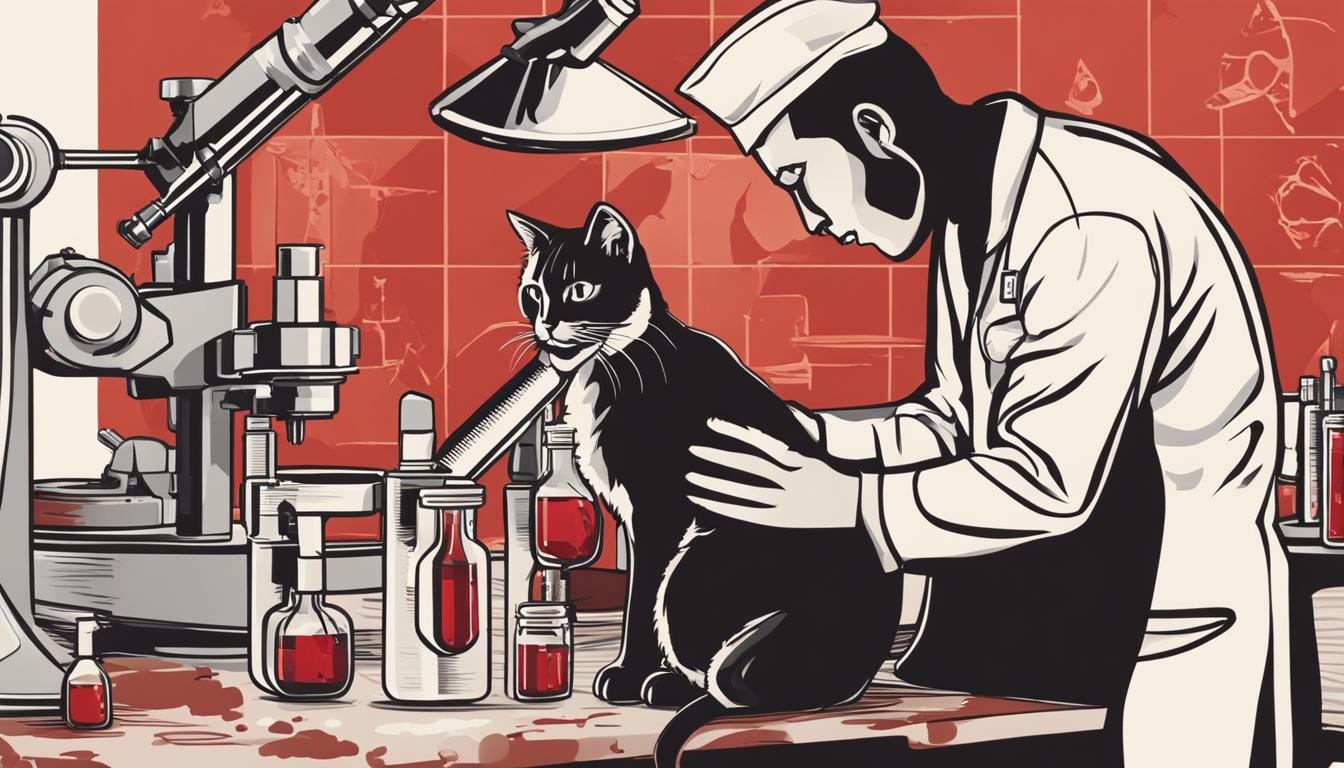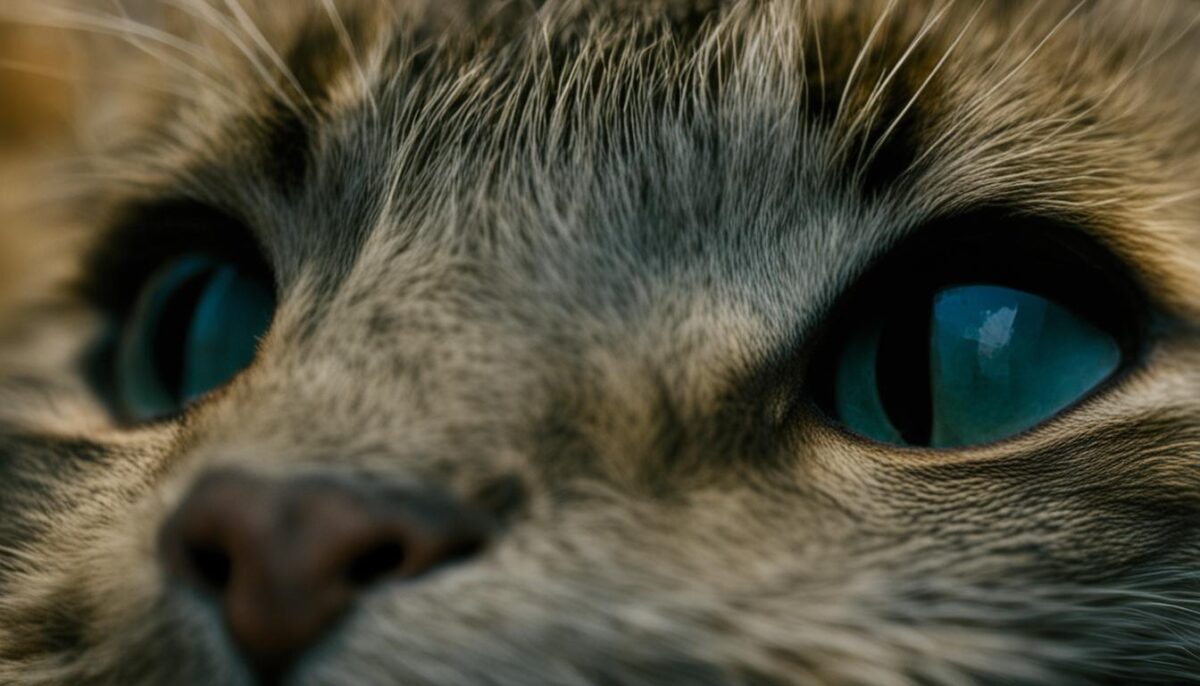You might worry about keeping your cat healthy. Just like people, cats can get sick too. But did you know cats can’t get human HIV? There is a cat version called FIV, which stands for Feline Immunodeficiency Virus. It’s a big word that means some cats have weak protection against diseases. Cats with FIV can still live happy lives, but they need some extra care to stay healthy. It’s important to keep these cats safe inside so they don’t spread the virus.
If you have a cat, you might hear about FIV. FIV in cats is like cat HIV, but it’s not the same thing people get. So, you don’t have to worry about catching it. But you do need to know how to prevent your cat from getting FIV to keep it from feeling sick. Learning about feline diseases and cat health risks is a smart move to take care of your furry friend.
Key Takeaways
- Cats can’t get human HIV, but they can get FIV, which is a lot like it.
- FIV makes it hard for cats to fight off sickness, so we need to keep them safe.
- If your cat has FIV, it’s best to keep them inside to stop them from spreading it to other cats.
- Learning about feline health can help you take better care of your cat.
- You can’t get FIV from your cat, so you don’t need to worry about that.
The Basics of FIV: A Feline Health Concern Similar to HIV
Have you ever heard of FIV, or what some people call feline HIV? It’s a big health problem for cats all over the world. Cat immunodeficiency virus is another name for it. Just like the human version, HIV, this feline retrovirus makes it hard for your cat’s body to fight off sickness.
But don’t worry too much! Even if a cat has FIV, it can still have a happy life for many years. It’s important for cats with FIV to not get other big cat sicknesses, like feline leukemia. Think of it this way: cats with FIV need a little extra care, just like people with a cold need to rest and drink lots of fluids.
FIV basics tell us that there’s no cure yet, but your furry friend can still have many good years ahead. To help you understand FIV symptoms in cats, take a look at this picture. It shows how to spot if something might not be right with your cat.
Some FIV symptoms in cats are hard to spot. Cats can act normal for a long time before any signs show up. Here’s a list that can help you know what to look for:
- Getting sick often with things like colds
- Bad breath or problems in the mouth
- Being very tired or not wanting to play
- Losing weight without trying
Knowing about common cat diseases like FIV helps keep our cat friends healthy. If you think your cat might have these signs, it’s a good idea to take them to the vet so they can feel better. Remember, being kind and looking out for your pet will make both of you happier!
Can Cats Get HIV? Debunking Myths About Feline Viruses
Hey there! Let’s talk about our kitty friends and a big mix-up some people have about FIV in cats. Some folks think cats can get HIV like humans, but that’s not true! Cats have their own virus called FIV, which is a bit like HIV, but only for cats. It’s super important to know the real facts so we can be the best pet parents ever!
Understanding FIV: The Feline HIV Equivalent
Have you heard of FIV or feline viruses? Well, FIV stands for Feline Immunodeficiency Virus, and it’s something cat owners should understand. It’s whats some people call ‘cat HIV,’ but despite that nickname, FIV is different and it’s only for cats. Just because FIV is sorta like HIV, doesn’t mean cats with FIV don’t deserve lots of love and plays.
Differences Between FIV and Human HIV
Sometimes people get confused and worry if their cats might give them HIV, or if they can give HIV to their pets. But don’t worry! FIV and human HIV are species-specific viruses, which means each stays with its own kind. FIV is just for cats, and humans can’t catch it, which is great news for cuddle time!
Let’s look at what makes FIV and HIV different:
| FIV in Cats | HIV in Humans |
|---|---|
| Only infects cats | Only infects humans |
| Affects cat’s immune system | Affects human’s immune system |
| FIV is not contagious to humans | HIV cannot infect cats |
Why FIV is Not a Concern for Human Health
Guess what? If your furball friend has FIV, it’s totally okay for human health. No need for any worry about catching the virus from our petite pet pals. Because FIV is special for cats, there are no health risks of FIV when it comes to people. So, your family is totally safe and can keep giving those cozy cat hugs!
Remember, just like each person is one-of-a-kind, so are viruses. This means FIV is a cat-only virus, and it’s important not to believe cat HIV myths. Now you know the facts, you can help friends and family understand more about FIV safety and that these feline viruses can’t jump to people. This makes pet time with our fluffy friends all fun and no fret!
Transmission of FIV Among Cats: How the Virus Spreads
When you think of your furry friends playing outside, it’s hard to picture things going wrong. But sometimes, cats can get into fights, and this can lead to some serious health problems. One of these is called FIV – it’s similar to a human virus but just for cats. So, how do cats get FIV? Well, let’s dive in and learn about it together!
The Main Route: Bite Wounds and Aggressive Behavior
Most often, cats catch FIV when they get into scraps with other cats. If one cat bites another, the virus can spread through the bite wound. Aggressive cats are more at risk, especially if they are outdoor cats who run into others with the virus. It’s not just about the biting, though. The fighting itself can be dangerous. It’s better to keep the peace and help reduce cat fights for your cat’s safety.
Cases of Mother-to-Kitten Transmission
Have you ever wondered if baby cats can get FIV from their moms? It’s not very common, but it can happen. This is called mother-to-kitten FIV transmission. If a mamma cat has FIV while she’s pregnant or nursing, the virus might spread to her kittens. This is something to think about if there is a chance of breeding FIV-positive cats. It’s always good to check on feline motherhood and kitten health risks with your vet to keep the little ones safe.
Minimizing Risk: Importance of Keeping Cats Indoors
If you want to keep your cat from catching FIV, the best move is to make them an indoor cat. This simple step can vastly cut down on the risk of them getting FIV because they won’t be out there getting into trouble with other cats. Plus, having a cozy home where they don’t fight any cat they see helps a lot in preventing FIV. The indoors is the best playground for FIV-risk reduction and feline safety. You’ll know they’re protected from outdoor cat dangers, and they’ll still have loads of fun inside with you.
So, keeping your cat away from fights and indoors can really help in keeping them safe from FIV. Remember, no cat is too tough to get hurt, and it’s our job to take care of them.
The Clinical Stages of FIV: From Infection to Symptoms
When your cat gets FIV, they go through different stages. We call these the FIV clinical stages. It’s like a story for your cat’s health as the virus lives in their body. Knowing these stages helps us understand and take better care of our furry friends.
In the first stage right after a cat gets the FIV infection, they might have a fever or seem a little off. But soon they start to feel better, even though the virus is still there.
Then comes the second stage. Cats look fine, but it’s like the calm before the storm. The virus is quiet, but it’s hurting the cat’s body little by little. This is a tricky time because they seem okay, but they’re not. This is all part of the cat health progression with FIV.
Finally, the third stage is the toughest. Cats get FIV symptoms more often, like when we catch a cold that keeps coming back. Cats in this stage can have bad teeth, lose weight, and have other troubles.
Here’s a simple table to show you what happens in each FIV stage:
| Stage | Time After Infection | Main Symptoms |
|---|---|---|
| First Stage (Acute) | Initial Weeks | Fever, Tiredness |
| Second Stage (Asymptomatic) | Months to Years | May appear healthy |
| Third Stage (AIDS-like) | Varies | Poor dental health, Weight loss, Frequent illness |
By recognizing FIV early and knowing these FIV health phases, you can help your cat live a happier and healthier life. Always keep an eye on your furry buddy and visit the vet for help.
Testing and Diagnosis: Detecting FIV in Your Feline Friend
When it comes to keeping your cat healthy, knowing about FIV testing is really important. It’s how vets figure out if a cat has this virus. If you think your kitty might have FIV, the vet will use special tests to check.
The Role of Antibody Tests in Diagnosing FIV
One common way to check for FIV is by using FIV antibody tests, like the ELISA test. This test looks for stuff in the blood that fights the FIV. It’s good at finding out if a cat has been fighting off the virus. But sometimes, it can be a bit confusing. For kittens, they might get a ‘false positive’, which means the test says they have the virus when they really don’t. That’s why these little guys might need to be tested again when they get older.
PCR Testing: An Advanced Method for FIV Detection
PCR testing for FIV is a really smart way to look for the virus’s genetic material. This means it’s looking for pieces of the virus itself, not just how the cat’s body is dealing with it. It’s a part of advanced FIV diagnosis. Even though it’s super clever, sometimes it can also get it wrong, just like the antibody tests.
Understanding False Positives and When to Retest for FIV
Sometimes a cat might get a test result that says it has FIV, but it’s not true. That’s what we call a ‘false positive’. It can happen for a few reasons. Remember the kittens we talked about? They might need to be retesting for FIV once they’re a bit older, like six months, just to make sure the first result was accurate. Your vet wants to be super sure about things, so don’t be surprised if they want to do more tests. Making sure the diagnosis is right means your cat gets the best care.
After finding out if your cat really does have FIV, your vet will help you understand what to do next. Even with FIV, cats can still have happy and cuddly lives. You just need to know how to look after them the right way!
Treatment Plans and Managing an FIV-Positive Cat
If you find out your kitty has FIV, don’t worry too much! Cats with FIV can still have many happy years with you. Taking care of an FIV cat means some changes, but you can handle it! Let’s check out how to do this.
Lifestyle Adjustments and Veterinary Care
First, keep your furry friend inside. They will be safe and won’t spread the virus to other cats. A peaceful home is a happy home for FIV cats. Try to give them their own space with cozy beds and lots of love.
It’s also super important to see the vet regularly. Twice a year is a good plan! Your vet can help make sure your cat stays healthy and catch any small problems before they get bigger.
Supportive Therapies and Secondary Infection Management
FIV cats sometimes get other sicknesses because their immune systems aren’t as strong. If this happens, your vet will know the best way to help, like giving them special medicine. Some medicines can fight off these extra sicknesses and keep your pal feeling good!
Long-Term Outlook and Quality of Life for FIV Cats
Mostly, FIV cats live as long as any other cat if they get lots of tender loving care. They can be just as happy and purry as other kitties! You can help your FIV-positive cat by making sure they eat nutritious food, drink clean water, and always feel safe and loved at home.
Remember, every cat is different, so some might live longer with FIV, and some might have a shorter time. Just focus on giving them the best life while they’re with you!
Conclusion
As we wrap up our chat about FIV in our furry friends, it’s key to remember that knowing the real scoop matters. FIV is something cats can get, but it doesn’t have to be scary if we stick to the facts. Sharing what we learn about FIV helps keep kitties happy and healthy, and knocks out any false stories out there.
Combating Stigmas: Educating about FIV in Cats
When we talk and learn about FIV, we help our kitty pals a bunch. By sharing correct info, we take down the wrong beliefs about this cat health issue. Education is a huge part of caring for cats with FIV and makes sure they get the love and help they need.
Emphasizing Responsible Cat Ownership and Care Practices
Caring for your cat means keeping them safe from things like FIV. If your cat buddy has FIV, keeping them inside and visiting the vet often does wonders. Giving your cat lots of love and super care can truly make their life awesome. Remember, you play a big role in your cat’s well-being, so let’s make it the best it can be!
FAQ
Can my cat contract HIV from me, or can I get FIV from my cat?
No, cats cannot get HIV from humans, and humans cannot contract FIV from cats. Both viruses are species-specific, meaning FIV only affects cats, and HIV only affects humans.
How does a cat get infected with Feline Immunodeficiency Virus (FIV)?
Cats most commonly get FIV from deep bite wounds incurred during fights with other cats that carry the virus. It is less commonly transmitted from a mother to her kittens or through sexual contact.
Are there specific signs that my cat has FIV I should look out for?
FIV-infected cats may not show signs for years. However, common symptoms to watch for include poor coat condition, recurrent infections, fever, weight loss, and dental disease. If your cat exhibits these signs, consult your vet for testing.
Is there a way to prevent my cat from contracting FIV?
The best way to prevent FIV is to keep your cat indoors, avoiding exposure to potentially infected cats. Ensuring your cat is spayed or neutered can also reduce the risk by minimizing their territorial and aggressive behavior.
What are the stages of FIV in cats?
There are three stages: an acute stage right after infection, a subclinical period where the cat shows no signs of illness despite being infected, and a chronic stage characterized by various secondary infections and health issues.
How is FIV diagnosed?
FIV is primarily diagnosed through blood tests that detect antibodies against the virus. If an initial test is positive, further confirmatory tests, like PCR, which detects the genetic material of the virus, may be utilized.
Can a kitten born to an FIV-positive mother test positive for FIV and later test negative?
Yes, kittens can receive antibodies from an infected mother and test positive for FIV. However, these antibodies may clear after a few months, at which point retesting can reveal if the kitten is truly FIV positive or not.
If my cat tests positive for FIV, what are the treatment options?
While there is no cure for FIV, the focus is on managing the cat’s health through regular veterinary check-ups, keeping them indoors, and promptly addressing any secondary infections. A healthy diet, clean environment, and affection also contribute to their well-being.
Can FIV-positive cats live with other cats?
FIV-positive cats can live with other cats as long as they do not fight and risk transmitting the virus. Introduce pets carefully and provide a stress-free environment to minimize the chance of aggressive behavior.
Should I vaccinate my cat against FIV?
An FIV vaccine exists, but it is not universally recommended due to its variable efficacy and the possibility of causing a cat to test positive for FIV. Consult your veterinarian to determine the best preventative measures for your cat’s situation.
Source Links
- https://www.vet.cornell.edu/departments-centers-and-institutes/cornell-feline-health-center/health-information/feline-health-topics/feline-immunodeficiency-virus-fiv
- https://vcahospitals.com/know-your-pet/feline-immunodeficiency-virus-infection
- https://www.webmd.com/pets/cats/cat-fiv-feline-immunodeficiency-virus


